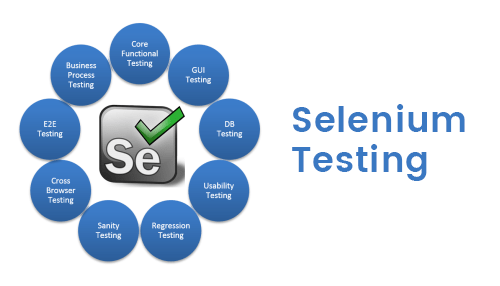Selenium Testing For Effective Test Automation
While there’s a substantial amount of increment in the mobile application market share, web applications are still prevalent with a significant user base. Enterprises focus on the quality at speed when it comes to web applications, before deployment. This is where the important role of testing comes into play. UI testing unlike some functional testing that is automated, is still considered as a manual process. But it is sensible to automate testing that will save you time and effort. When it comes to automation, Selenium automation testing tools is the first thing that comes to mind.
So, let’s learn what it’s about the Selenium web testing tool that made it such a big deal.
What Is Selenium?
Selenium is the best automation testing tool for various web applications. It is an open-source tool that is widely used to automate tests on web browsers. Selenium web testing tool is one of the most widely used taking to its various advantages – ease of use, availability, and simplicity. The introduction of Selenium has attracted many eyeballs and become a favorite tool among automation testers.
SELENIUM SUITE
It is accurate to call Selenium and Selenium Suite since it’s a collection of four different tools or components namely.
1. Selenium Remote Control (RC)
2. Selenium WebDriver
3. Selenium IDE
4. Selenium Grid
Selenium RC
The first product in the Selenium lineup was Selenium Remote Control, now known as Selenium 1. Due to its certain limitations and merge with WebDriver, it was soon deprecated and is no longer supported. Selenium RC has been developed to overcome the issue of the Same Origin Policy (SOP).
Under the SOP policy, the JavaScript codes can only access the domain elements that are true to its parent domain.
Before the existence of Selenium RC, testers used to install the copies of Selenium core and Web Server locally with web applications that are to be tested, so that, they would belong to the same domain.
How does Selenium RC solve the SOP issue?
It tricked the web browser with the fact that both Selenium Core and Web Server to be tested should belong to a single parent domain. This can be achieved by including a proxy HTTP server that will RC a dual component tool – Selenium RC Server & Selenium RC Client.
With Selenium RC you can choose user preferred languages to write the test cases. This was the first flagship testing tool of the Selenium project. It supports the following list of languages –
1. Ruby
2. Python
3. PHP
4. Perl
5. Java and
6. C
You can visualize the whole Selenium structure below. We have highlighted three main products that are still heavily supported and recognized by the community – Selenium WebDriver, Selenium IDE, and Selenium Grid.

Let’s describe each of them quickly.
Selenium WebDriver
Most of the time, when people talk about Selenium, they mean Selenium WebDriver. The largest chunk of the product’s development focuses on the Selenium tool for automation testing.
Selenium WebDriver was created in 2006 as the replacement for Selenium RC. Unlike Selenium RC and Selenium IDE, the WebDriver provides an interface to create and execute test cases in a way that the elements of a web page can be hassle-freely identified and necessary actions will then be performed.
In 2008, Selenium WebDriver merged with Selenium RC and evolved as a more potent tool known as Selenium 2, keeping WebDriver as the core. So, Selenium WebDriver is called as an upgraded version of RC. It employs a contemporary and consistent browser automation approach. Selenium WebDriver is faster than RC as it directly calls the browser whereas RC needs a server to interact with the browser. Also, RC depends on Javascript for web automation testing. Each web browser has its driver like –
1. IE Driver
2. Opera Driver
3. Safari Driver
4. Firefox
5. Chrome Driver and
6. HTM Unit Driver
Automation testing tools selenium also supports other languages similar to that of RC.
Selenium IDE
Selenium Integrated Development Environment is the simplest and easiest way to learn component or tool in the Selenium automation testing suite. Selenium IDE is a Firefox plug-in which users can install easily to record and run test cases frequently at a faster pace. That’s why Selenium IDE was initially known as Selenium Recorder and speeding up the creation of test cases was the other idea behind the development of Selenium IDE.
It works in the way – user interactions with the web browser are recorded and test cases are created based on these recordings.
Selenium Grid
Selenium Grid is one of the Selenium automation testing tools used with Selenium RC to execute test cases remotely. Initially, Selenium Grid was named as Hosted QA and was a part of Selenium 1.
Selenium Grid uses Hub-Node design to support parallel execution of multiple test cases on different machines that are located remotely. There are two machines in Hub-Node design. The first machine control is treated as Hub. It controls the running test cases on different browsers and OS. And the other machine is treated as Nodes on which test cases can be written in user preferred programming language.
Why Selenium Automation Testing Tools Are Considered To Be the Best?
Why Selenium web testing tool is considered to be the best among other automation testing tools? Below are the points to ponder over:
1. It’s a free, open-source automation testing tool.
2. It supports parallel text execution.
3. It can be integrated with Maven, Docker, and Jenkins to attain continuous testing.
4. It can be integrated with TestNG and JUnit to generate test reports and manage test cases.
5. You can execute the test cases while the browser window is minimized.
6. It provides high tester flexibility to write complex and advanced test cases.
7. Supports testing on different web browsers like Opera, Safari, Chrome, Firefox, and Internet Explorer.
8. Supports test scripts written in user-preferred languages like Python, Ruby, PHP, Perl, Java, C#.
9. Supports test case execution on multiple OS like Mac, Android, iOS, Linux, and Windows.
Apart from the aforementioned advantages, Selenium automation testing tools have following shortcomings like,
1. Selenium can test only web applications. It cannot test other desktop and software applications.
2. No guaranteed user support is available.
3. Selenium independently does not support image testing.
4. Selenium cannot access the web elements outside the web applications that are under test.
CONCLUSION
Selenium web testing tool has both advantages and shortcomings in comparison to other automated testing tools. But Selenium overshadows other testing tools in areas of –
1. Flexibility – Selenium supports execution on multiple OS and browsers, test scripts in multiple languages.
2. Parallel Testing – Tester can execute test scripts simultaneously on multiple machines.
3. Cost – Selenium is an open-source testing tool and comes free of cost.
In a nutshell, the different components and the above major features of Selenium make it one of the best web automation testing tools.
Oditek Solutions since it’s inception in 2012, has been using Selenium for scores of different test automation projects successfully. Our test automation expertise spans across web based products, enterprise-grade software applications, and mobile applications. Specially for business-critical web scale cloud products like SaaS applications, eCommerce portals, insurance, education and healthcare web based products, we have extensively used Selenium to automate all regression test cases giving a high RoI. Contact us today for a demo!







